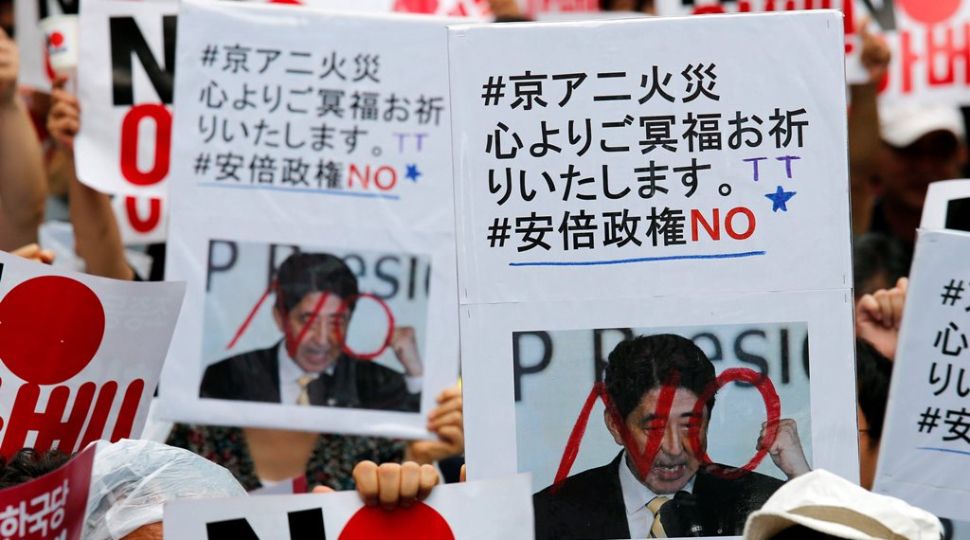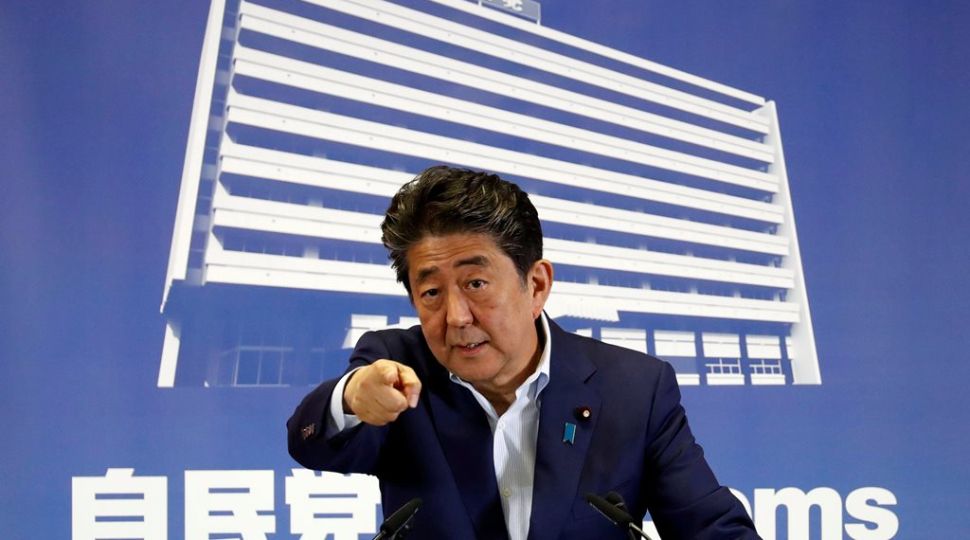Japan-South Korea Tensions with History in the Background

Relations between Japan and South Korea are complex. On the one hand, both countries are allied with the U.S. and face regional challenges, such as China’s rising power and military development in North Korea. In economic relations, Japan and South Korea are key trading partners. In 2018, trade was valued at $81 billion, with South Korea having a deficit of about $25 billion (the largest in the country’s trade balances). On the other hand, the countries are divided over history. Despite the normalisation of relations in 1965, the parties continue to argue about issues related to Japanese colonial rule and the occupation of Korea in 1910–1945. The dispute at the moment concerns compensation for Korean forced labourers and women forced to serve as sex slaves for Japanese soldiers.
Historical Context
From the beginning of his term in May 2017, the liberal president of South Korea, Moon Jae-in, has raised historical problems in the relations with Japan to a greater extent than his conservative predecessors. Moon is dissatisfied with the methods used to resolve disputes in recent years, including the December 2015 agreement on Korean sex slaves. Under it, a South Korean foundation was established, to which Japan donated about $9 million to pay compensation to victims and their families. In Moon’s opinion, the agreement was too hastily concluded by his predecessor, Park Geun-hye, it was not consulted with the opposition or the victims, so it should be revised. Japan disagrees, claiming South Korea is must abide by the deal. The lack of agreement in this matter prompted South Korea to dissolve the foundation.
Another problem is the issue of compensation for Korean victims of forced labour during Japan’s colonial rule. In October and November last year, the Supreme Court of the Republic of Korea ordered two Japanese concerns, Nippon Steel & Sumitomo Metal and Mitsubishi Heavy Industries Ltd to compensate 32 South Korean citizens working for these companies as forced labourers between $68,000 and $127,000 each. South Korea claims that the 1965 treaty on the normalisation of relations did not resolve the problem of individual compensation. In Japan’s opinion, these issues were settled in the treaty, which barred the companies from paying compensation. As a result, in January and March this year, South Korean courts ordered a freeze on some assets of these corporations’ operations in South Korea and took over part of their property. Japan’s suggestion in May for arbitration to resolve the dispute was rejected by South Korea in July. The controversy over historical events led the leaders of the countries—Moon Jae-in and Abe Shinzo—not to meet during the G20 summit in Osaka at the end of June.
Escalation of Tensions
The sharpening of political and historical tensions prompted Japan to move the dispute to trade issues. On 1 July, Japan announced it would impose restrictions on exports to South Korea of three materials, fluorinated polyimides, photoresists, and hydrogen fluoride, necessary for the production of semiconductors and electroluminescent displays (LEDs) used in smartphones and TVs. From 4 July, Japanese companies selling these materials to South Korea must first get permission from the authorities, which could take up to 90 days. The Japanese government justifies the restrictions on security concerns, indicating that South Korea does not control exports of strategic items that can be used for the production of weapons of mass destruction or conventional arms. There were suggestions that hydrogen fluoride from Japan, which also can be used to produce chemical weapons such as sarin gas, could have been transferred to North Korea and other places. South Korean authorities deny this happened and cite a lack of evidence from the Japanese.
Working-level talks held on 12 July ended in failure and the parties announced they saw no need for further meetings. South Korean authorities then stated they would file a complaint with the World Trade Organization (WTO) over the Japanese measures. However, with the U.S. blocking the appointment of judges to the WTO Appellate Body, the dispute is not expected to be resolved soon. The South Koreans, in turn, have begun a boycott of Japanese products and travel to Japan. According to a Gallup Korea poll conducted on 11 July, measures like these are supported by two-thirds of Koreans. It is possible that Japan will extend the export restrictions to other goods and it announced it is considering removing South Korea from its “white list” of preferential trade partners, which implies the potential of restrictions on exports to South Korea of more than 850 items deemed sensitive.
The Japanese actions could be severe for South Korea’s economy. It imports from Japan 93.7% of the fluorinated polyimides it uses, 91.9% of the photoresists, and 43.9% of the hydrogen fluoride. The sale of semiconductors and LED displays produced from these materials amounts to about a third of South Korean exports. The Japanese restrictions may induce another problem, which is a global drop in demand for semiconductors. In June, the export of these products from South Korea was 26% lower than in the corresponding period of the previous year. Regardless, South Korean companies remain key in global value chains in the electronics industry. For example, Samsung Electronics and SK Hynix account for about two-thirds of the global memory chip market.
Another important factor is that the export restrictions came into force on the day of the start of the official campaigns in Japan for elections to the House of Councillors, the upper house of parliament, which took place on 21 July. Prime Minister Abe’s resolute action towards South Korea was intended to strengthen the position of the ruling Liberal Democratic Party to make constitutional amendments.
Conclusions and Perspectives
The uncompromising attitude of Japan and South Korea does not indicate a quick calming of the situation, either in terms of the economic tensions or easing the historical disputes. Escalation may negatively impact both countries given the interdependence of their economies. Japanese producers of technological materials may lose an important market (for example, South Korea takes over 85% of the Japanese hydrogen fluoride). Tourism to Japan also may suffer, as Koreans comprised 25% (7.54 million) of the tourists visiting the country last year.
In the short term, South Korean companies will be able to continue production from component stocks, but in the long-term, the Japanese restrictions may result in a slowdown in the production of components for consumer electronics products and a drop in exports of these goods from South Korea. To prevent this, the authorities promise to expand the country’s production capacity of materials it had been importing from Japan. In addition, they intend to diversify suppliers, possibly China, Taiwan, Russia, or Germany. This may create opportunities for European states with a well-developed chemical industry.
Expanding its own production capacity and diversifying suppliers will be time-consuming and expensive for South Korea. If the Japanese restrictions remain in place longer than one fiscal quarter, they may disrupt global supply chains of consumer electronics products, including smartphones or TVs, and that, in turn, could translate into an increase in prices. Further restrictions on exports from Japan to South Korea could include materials needed for the production of lithium-ion batteries for electric cars, which could disrupt the supply of semi-finished products processed in South Korea from Japanese materials for plants in other countries, such as the LG Chem factory near Wrocław, the largest European producer of these batteries.
The Japan-South Korea dispute also raises the possibility of political fallout in other countries in the region. Tensions between the U.S. allies reveals deficiencies in cooperation in the Japan-U.S.-South Korea triangle, which weakens the development of a common stance towards China and North Korea. U.S. involvement to resolve the dispute is possible. It can put pressure on them because both South Korea and Japan depend on the best possible relations with the U.S. Meanwhile, Moon is counting on progress in the dialogue between President Donald Trump and North Korean leader Kim Jong Un, and Abe is looking forward to favourable decisions in trade negotiations with the U.S.



